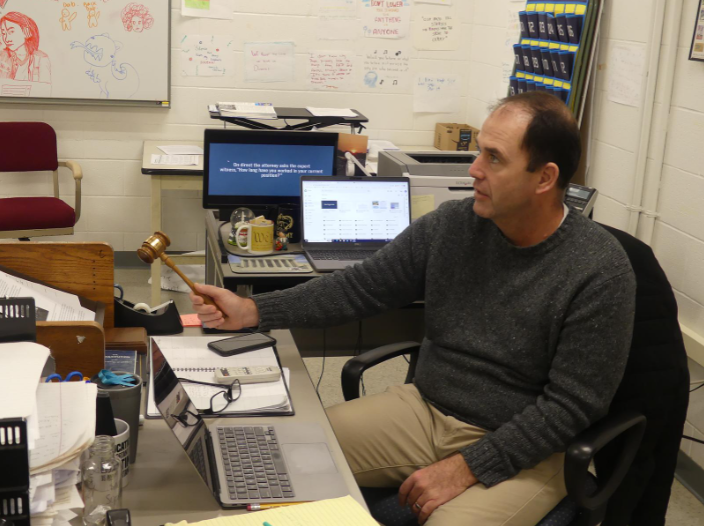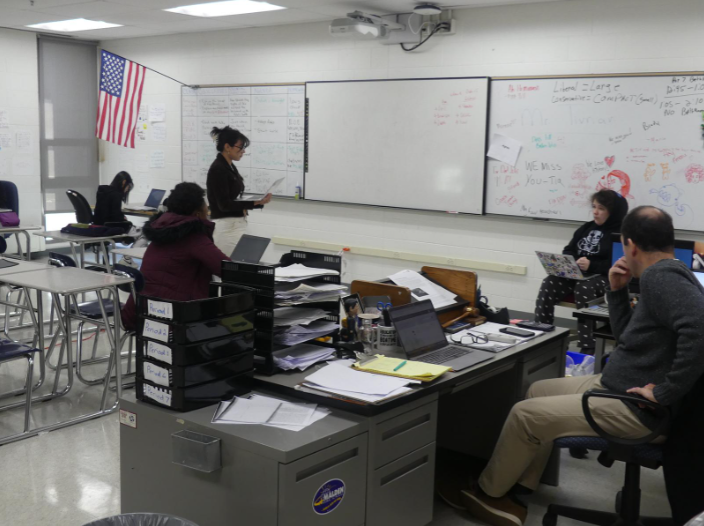
Some students may love history, some might not, but we all know it’s important to learn about history and how it has evolved over time.
The Social Studies department, which is commonly referred to as the history department, has some changes about staffing this year.
“One of the biggest goals we have is we want students to understand why they’re learning about issues in the past and how it connects to their lives and relates to today. There’s very few events in history that are isolated to just that time period that don’t have parallels to today. One in particular that’s a big one is when we learn about the Great Depression and the New Deal; we’re talking about the rule of government in people’s lives and the economy and how much the government should be assisting people when they fall on hard times and to what degree,” Kerry Veritas, the teacher lead of the social studies department, said.
Veritas teaches two sections of AP World History but she is also covering a section of 9th Grade United States History (US I) for a teacher until he comes back from leave.
“In US I, we are in the middle of a migration and settlement unit and in this particular part of the unit we’re learning about what happened to the Indigenous people of this country, from the time of the colonists in Massachusetts Bay up to the Indian Removal Act of 1830. We’re just looking at that pattern of forced migration and then we’re going to connect that to Manifest Destiny, the idea that the United States felt they had the right to spread and settle to the west, but that brings up again conversations about what rights did people have.”
“We want students to understand why they’re learning about issues in the past and how it connects to their lives and relates to today”
KERRY VERITAS
The social studies department does a variety of things in their classes and as a department besides studying history, from Model UN to hosting Mock Elections.
Veritas explained that the social studies department has been doing Model UN “for many years.” She continued, “Mock elections, we did many years ago we just suspended them for COVID. They were something we brought back since we are now in person. It is the belief of the history department that when students are civically engaged at a young age they are more likely to vote when they are adults so we like to get them aware of a few things, that elections happen every year not just in a presidential year.”
Veritas stated that, “We like the experience to be as close to real as possible, it’s proven that voting is a habit and the more you do it, the more likely you are to do it in the future and so, we were really proud to work with the city, who lent us the voting booths that the city actually uses, and photocopied all the ballots. It was a lot to run but I think it was worth it.”

This year, Malden Public Schools hired a new director of social studies for grades K-12, Gerard Tannetta. Tannetta transferred from Melrose.
“Malden has a lot more to offer with just the amount of staff and students there are, there’s the ability to throw in different courses to happen, the FLEX period I think is an awesome creation that Malden is doing, it’s not something that we had in Melrose,” Tannetta explained.
Malden Public also hired two new additions to the social studies department, Ashley Garlick and James Hill.
“It’s been a good year so far, first year at Malden; [it’s been] been comfortable and smooth. I want to make sure everyone improves in history skills,” Hill said.
“It’s been nice, the school has been very welcoming, the students are friendly and the history team is very supportive,” Garlick said. The new teachers both feel that students were welcoming and their experience has been comfortable so far. Garlick also stated that she is “trying to connect with the students, build relationships, and teach about different aspects of US and World history.”
Richard Tivnan, veteran teacher at Malden High School, thinks that the history department should “broaden out some of the elective classes. I hear some schools have some cool classes that we don’t have. I think we have a decent amount of electives, like sociology, psychology, AP Gov. But everytime you could broaden that up a little more, to give kids a little more of a choice, I think that’d be good.”
Tivnan also teaches a class called Mock Trial, where students in grades 10 -12 are given cases which are filled with witness statements to get students civically engaged from a classroom and experience in the legal system.

Tannetta also feels the need to increase the amount of electives in the history department. “We are also exploring trying to increase the amount of electives we have in the History department… we would like to expand what we have.”




